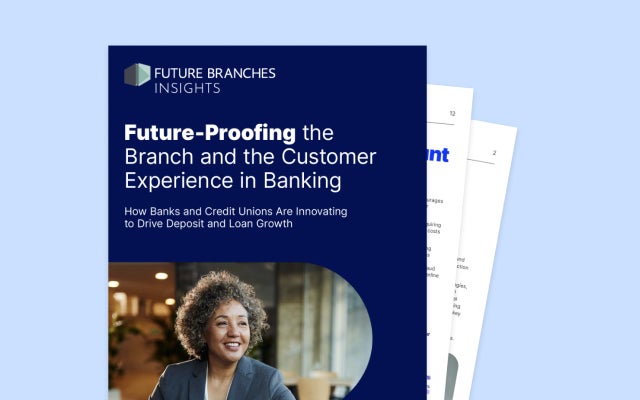March 23, 2022 in Challenges and solutions
Why artificial intelligence is critical to banking
AI is helping lenders streamline, cut cycle times, and process higher loan volumes.

If you’re a leader or professional at a financial institution, you may have noticed that artificial intelligence (AI) has become increasingly ubiquitous in the world we live in. AI has offered financial leaders unique ways to meet customer demands and provide the pathway to create personalized experiences, which in turn, is unlocking enhanced levels of engagement, especially in the last several years.
Discover a few key insights of your own
Subscribe for industry trends, product updates, and much more.
What’s driving this prevalence? A major factor is the power of AI to derive key insights from the vast volume of data sources available today, including data that was previously locked in physical paperwork. Another is the capability to automate manual processes and reduce the amount of tedious work so lending teams can focus on delivering the best customer experience.
It’s an exciting time for our industry and its consumers because as technology continues to grow, financial services providers can increase their ability to deliver personalized, pre-filled, and instant experiences that offer higher value to the consumer.
Let’s discover how the banking industry is using AI to help industry leaders and employees work smarter and more productively, explore an example from Blend, and address some challenges you may be experiencing.
AI is making its mark on banking
AI enables organizations to reduce manual processes and automate the experience for customers and loan teams. With AI, financial institutions can save an estimated $447 billion by 2023 and gain an additional $1 trillion in value.
One of the most impactful features of AI-enabled software is the ability to verify and make use of data that was historically locked in the physical world. This unlocked data can then be applied in numerous, experience-improving ways: report automation, intelligent document review, or data extraction, just to name a few.
Leading banks rely on AI and analytics capabilities to add value in five main areas:
- Customer acquisition
- Lending and credit decisioning
- Monitoring and collections
- Deepening relationships
- Smart servicing
With machines aiding these kinds of processes and providing more accuracy, businesses can boost their ROI. Automation and increased accuracy may help save on cost per mortgage. A ROI study conducted by Marketwise for Blend revealed that some of our customers were able to realize a potential savings of $827 per loan. They also experienced an average of 7.3 days cut from the loan cycle thanks to developing AI-influenced features that streamline the mortgage process and empower loan teams to work more efficiently.
How loan teams benefit from AI
Without a doubt, we’ve made amazing strides with AI innovation, but there are limits to its power. The impact of AI on lending is furthering interpersonal connection and is helping humans to do their jobs better and put the customer first.
Oftentimes, borrowers may not understand the loan process and what to expect when purchasing a home. Having a loan officer to act as their guide can help alleviate borrower stress and worry. Thanks to time savings that AI can unlock, loan teams can dedicate time to adding value to the customer experience and nurturing loans through to close much faster. Deepening relationships in this way helps create satisfaction, referrals, and repeat business.
One less obvious benefit comes in the form of talent retention. In a very competitive market with high loan officer turnover, having the best technology may help boost loan teams’ productivity, happiness, and ultimately, their desire to stay with a lender.
How Blend is making an impact on AI
Blend is raising the bar for AI innovation by providing document processing automation across the mortgage lifecycle, and one way we’re doing so is through our DocAI solution.
Helping to power our Mortgage Suite, DocAI utilizes AI to accelerate the pace of mortgage application completion. This is done through document validation, data extraction from documents, and triggering workflows based on the contents of those documents.
Driving AI innovation forward and seizing opportunities for growth means constantly finding new ways to improve the technology. At Blend, we do this through the lens of three “R’s” — responsiveness, reliability, and relevancy. Here’s how DocAI checks these three boxes:
Responsiveness: Loan teams can increase decision speed by using DocAI to review W2s, paystubs, and bank statements. If the documents are unvalidated, an automatic email will be sent to the borrower, requesting the correct documents to continue moving the process forward.
Reliability: DocAI can help reduce errors and missing information by automatically flagging mismatched data from source documents and autocompleting fields extracted from source documents.
Relevancy: By reducing the need for lenders to perform manual tasks, their time can be focused on delivering personalized, high-touch value and guidance for customers during the complicated mortgage process.
Currently, DocAI is in Blend’s pilot program and only provides document validation. However, we plan on implementing more innovations around document processing in the near future.
Challenges and risks
While innovations around AI are moving the industry forward, it isn’t without hurdles and investment risks. According to one report, 40% of organizations that make big investments in AI did not report business gains.
There’s also the negative stigma that AI will take jobs away from humans. According to a separate study, 85 million jobs will be replaced by machines by the year 2025 while 97 million new jobs will be created.
Machines, while capable of improving work processes and automation, lack the human connection that is often needed for consumers to feel like they’re being heard so they can confidently open up and ask questions. AI and humans will always work together, with the expectation that the technology will enable humans to work better, faster, and more accurately.
For the financial services industry and its continued push to move to digital, much of the focus is about bringing proactive finance, personalization, and improving automation.
AI ties these experiences together by providing a smarter, more accurate grasp of consumers’ preferences and behaviors to create a more personalized journey.
I truly believe AI is the next frontier for how we can continue to create a much better end-user experience. Do you agree?

Ready to learn how Blend’s mortgage solution is helping to transform the financial industry with AI and data?
Find out what we're up to!
Subscribe to get Blend news, customer stories, events, and industry insights.

